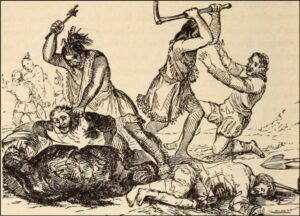by James A. Bacon
I’ll make Delegate Delores McQuinn, D-Richmond, a deal: I’ll apologize for the sins of my ancestors against indigenous Americans in the 17th century if indigenous Americans apologize for the sins of their ancestors against the English.
McQuinn introduced HR 7 with support from five other Democrats, that would “acknowledge with profound regret … the dispossession of lands and the racist and assimilationist policies designed to erase the identity, culture, and sovereignty of tribal nations in the Commonwealth.” The bill goes on to list a series of transgressions of the English colonists against indigenous Americans — “conflict, trauma, dispossession and failed treaties” — most of which occurred before the English colonies became the United States.
Ironically, it was was 400 years ago almost to the day — March 22, 1622 — that Chief Opechancanough, successor to Chief Powhatan, ordered a surprise attack on the English settlements in Virginia, massacring 347 men, women, and children. Had not an Indian servant notified his master of the impending slaughter, allowing him to alert the Jamestown settlement, the entire English colony might well have been wiped out. (The colonists got their revenge a year later by luring the Indians into a peace parley, poisoning their liquor, and slaying the survivors.)
This genocide — and, yes, when you try to exterminate an entire people, it is literally genocide — goes unmentioned in McQuinn’s list of horribles.
In the leftist version of history, only one set of people are bad guys — Europeans. The Englishmen and other northern Europeans who colonized North America in the 1600s are to be judged by 21st-century standards of morality, while indigenous peoples and Africans are exempt from those standards.
The world of 1619 (if you use the date of the arrival of the first Africans in Virginia as your frame of reference) or of 1607 (if you use the Englishmen’s first contact with the Powhatan federation) was an ugly time. It was an era of endemic warfare in which the strong preyed upon the weak, in which societies were ordered in rigid hierarchies of wealth and servitude, and in which kings and emperors conquered and plundered their neighbors. This was the universal condition of every society that had evolved beyond the simple bands of hunter gatherers.
So, yes, in the 1600s the Englishmen, supplemented by African slaves, did displace the indigenous peoples of Virginia. But HB 7 oversteps historical reality when it states, “for centuries prior to English colonization, Algonquian, Siouan, and Iroquoian speaking people flourished on these lands.” (My bold face.)
Historians and archaeologists have pieced together a picture of indigenous societies in the 16th and 17th centuries shortly before the English arrived, but the evidence is highly fragmentary and incomplete. If there’s one thing we know about indigenous societies in the western hemisphere that did leave a rich archaeological record, they, too had stratified societies, launched wars of conquest, rose and fell in power, and treated outsider groups with remarkable cruelty. Whom did the Powhatan federation “dispossess?” We don’t know. Those peoples didn’t survive to tell the tale.
Here’s one thing we do know: the Indian way of war could be brutally cruel. It is unlikely that the Jamestown settlers were victims of the first war of extermination. Trouble yourself to read about the so-called Beaver Wars in which the Iroquois tribes obliterated the Hurons, Eries, and Susquehannocks in competition for the fur trade. Learn how Iroquois war parties devastated the European settlers during the French and Indian War. Dip into the history of the Comanches, a tribe that mastered horse riding and revolutionized Plains warfare, depopulating vast territories in the southern Plains, inflicting terror upon Apache, Mexicans, and Texans alike.
(Similar patterns could be seen in the West African kingdoms that grew in power and wealth by enslaving weaker populations around them, selling their captives to the Europeans, and acquiring guns and luxuries in exchange. If you’re of a mind to absolve the Africans of this mass slaughter by blaming the evil Europeans who created a market for the slaves, then consider the rise of the Zulu after Shaka revolutionized African warfare with novel tactics, depopulating vast zones, and sending the peoples of weaker kingdoms into flight — all before any interaction with the Europeans.)
The critical change in the trajectory of history occurred with the European Enlightenment and the spread of the idea — unprecedented in humanity — that under natural law all men were entitled to unalienable rights, including, in the words of Thomas Jefferson, “life, liberty and the pursuit of happiness.”
Those principles animated the creation of the United States. Leftists condemn the U.S. for failing to perfect those principles overnight in their institutions — as if any other society on the face of the planet ever has. But Americans were among the first to articulate the ideals and then act upon them — after many trials and tribulations, to be sure — to achieve the system we have today.
That system is yet imperfect. We have not achieved utopia, and never will. Knowing that, we can do one of two things: look backwards and flagellate ourselves over injustices and perceived injustices that occurred decades and centuries ago, as the ironically self-styled “progressives” are inclined to do, or we can look clear-eyed to the future and ask ourselves, what must we do to create a better society?
I believe in looking forward. Building a better world means letting go of ancient grievances. So, I’m willing to let bygones be bygones and forget the evils perpetrated by Opechanconough if McQuinn and her ideological brethren are willing to let go the historical misdeeds they dwell upon. Let us set our sights upon building better lives for all Americans.



